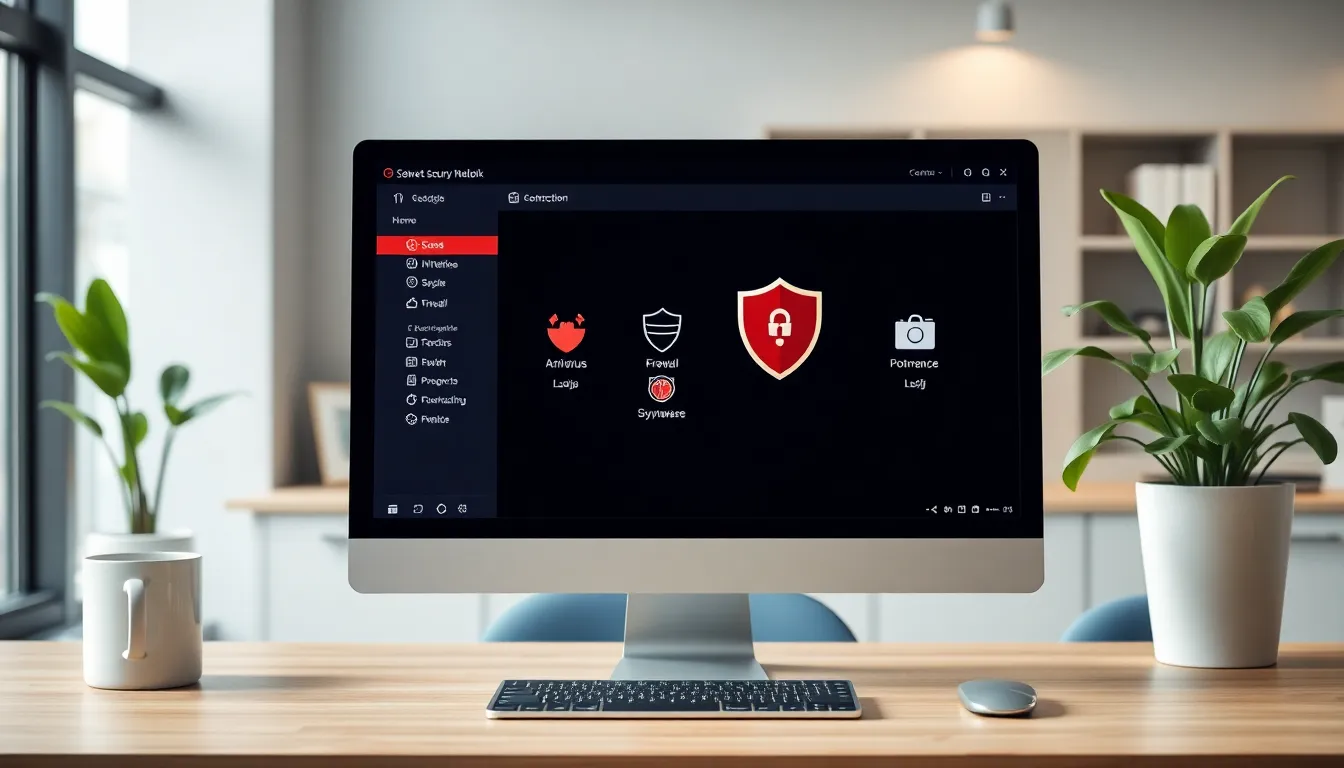In a world where cyber threats lurk around every digital corner, internet security software isn’t just a luxury—it’s a necessity. Imagine your computer as a fortress, and this software as the valiant knight standing guard at the gates. Without it, hackers might waltz right in, stealing your data and leaving you with a mess that even a superhero couldn’t clean up.
But fear not! The right internet security software can turn your digital life from a chaotic battlefield into a serene sanctuary. With features designed to thwart malware, phishing attempts, and other online shenanigans, it’s like having a personal bodyguard for your online activities. So, let’s dive into the realm of internet security and discover how to keep those pesky cyber villains at bay while you browse, shop, and stream without a care in the world.
Table of Contents
ToggleOverview of Internet Security Software
Internet security software protects computers and networks from various cyber threats. It includes multiple features designed to prevent malware infections and data theft. Antivirus programs detect and eliminate harmful software, while firewalls monitor incoming and outgoing traffic to block unauthorized access.
Additionally, anti-phishing tools safeguard users from deceptive emails and websites that attempt to steal sensitive information. Many security programs also offer identity theft protection, ensuring personal data remains secure during online transactions.
Regular updates enhance security software effectiveness, as they address newly discovered vulnerabilities. Protection settings can be customized according to user needs, allowing individuals and businesses to establish specific security protocols. Some software includes virtual private networks (VPNs) that encrypt internet traffic, making data transmission safer.
A crucial aspect involves evaluating different internet security software options available. Industry leaders in the market provide varying features at different price points, enabling users to choose the solution that best fits their requirements. Users benefit from free trials and reviews, which can help assess the performance and reliability of the software.
Cybersecurity threats continue to evolve, making it essential for users to stay informed about the latest developments. Knowledge of common threats, such as ransomware and spyware, empowers users to make informed decisions regarding their security software. Investing in reputable and effective solutions can ensure safer browsing experiences and better protection of valuable data.
Types of Internet Security Software

Different types of internet security software play crucial roles in safeguarding online activities. Each type addresses specific security concerns, forming a comprehensive defense against cyber threats.
Antivirus Programs
Antivirus programs target malicious software, such as viruses and worms, with the aim of detecting and eliminating them. These programs scan files during downloads or opens to identify and neutralize threats. Many include real-time protection features that monitor system activity continuously. Regular updates ensure they recognize the latest threats based on ongoing cybersecurity research. Popular examples of antivirus software include Norton, McAfee, and Bitdefender, known for their robust protection capabilities.
Firewalls
Firewalls act as barriers between trusted internal networks and untrusted external networks, controlling incoming and outgoing traffic. They block unauthorized access while allowing legitimate communication, protecting sensitive data from cyber intrusions. Hardware firewalls often reside in routers, while software firewalls are installed on computers. Configurable rules enable users to customize their security protocols based on individual needs. Effective firewall options include ZoneAlarm and Windows Firewall, providing essential protection against online threats.
Anti-Spyware Tools
Anti-spyware tools specifically focus on detecting and removing spyware, which covertly collects user information. These programs prevent unauthorized access to personal data by monitoring system behavior. Some anti-spyware solutions also offer real-time protection against emerging threats. Features such as scheduled scans enhance effectiveness, maintaining ongoing security. Well-known anti-spyware options include Malwarebytes and Spybot Search and Destroy, both recognized for their comprehensive scanning capabilities.
Key Features to Look For
Consider key features when selecting internet security software. These elements can enhance protection and improve user experience.
Real-Time Protection
Real-time protection identifies and neutralizes threats as they appear. This feature enables immediate scanning of files and websites, preventing malware from infiltrating systems. Many security solutions update their virus definitions automatically, ensuring users receive the most current defense mechanisms. It also helps detect suspicious behavior, alerting users before potential harm occurs. Effective real-time protection not only defends against known threats but also adapts to emerging risks.
Multi-Device Support
Multi-device support allows security software to shield various devices simultaneously. Such compatibility covers computers, smartphones, and tablets, ensuring comprehensive protection across platforms. Users benefit from seamless management through a single account. Many solutions even offer apps for mobile devices, providing convenience and access on the go. As more people use multiple devices, having software that supports them all becomes essential for maintaining security everywhere.
User-Friendly Interface
User-friendly interfaces simplify navigation within the security software. A well-designed interface enhances accessibility for all users, allowing even those with minimal technical knowledge to utilize the software effectively. Clear layouts, intuitive controls, and easily understood alerts contribute to a better overall experience. Moreover, the ability to customize settings provides users with control over their security preferences. Prioritizing usability ensures that individuals can focus on protection without cumbersome processes.
Best Internet Security Software in 2023
Internet security software protects against various cyber threats, ensuring a safer online experience. The right choice varies based on features, effectiveness, and user needs.
Top Picks Comparison
| Software | Key Features | Price Range |
|---|---|---|
| Norton 360 | Real-time protection, VPN | $39.99 – $99.99 |
| Bitdefender | Multi-device support, anti-phishing | $19.99 – $89.99 |
| McAfee Antivirus | Firewall, identity theft protection | $34.99 – $89.99 |
| Kaspersky | Cloud storage, user-friendly | $29.99 – $89.99 |
| Avast Premium | Wi-Fi inspector, system cleanup | $69.99 |
Norton 360 excels with its comprehensive features, including a robust VPN. Bitdefender stands out for its multi-device support that keeps all devices secure. McAfee adds extra layers with its firewall and identity theft protection. Kaspersky offers user-friendly navigation along with cloud storage. Avast Premium delivers strong Wi-Fi security and efficient system cleanup, making it a popular choice.
Customer Reviews and Ratings
Users frequently praise Norton’s efficiency and ease of use. Many find Bitdefender to be the best option for multi-device families. McAfee earns high marks for its identity theft protection, according to customer reports. Kaspersky frequently receives accolades for its interface and effective protection. Avast Premium maintains a solid reputation for its innovative features and customer service responsiveness. Consumer ratings highlight user satisfaction rates, showcasing each software’s strengths in combating cyber threats.
Investing in internet security software is essential for anyone looking to protect their online presence. With the right tools in place users can navigate the digital landscape with confidence knowing their data is secure. As cyber threats continue to evolve staying informed and choosing reputable software is crucial for maintaining safety.
Selecting the best option involves evaluating features like real-time protection and multi-device support. By prioritizing user-friendly interfaces and regularly updating software individuals can enjoy safer browsing experiences. Ultimately a solid internet security solution not only safeguards valuable information but also enhances overall online interactions.




